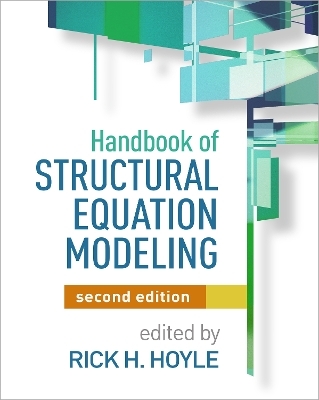
Handbook of Structural Equation Modeling, Second Edition
Guilford Press (Verlag)
978-1-4625-4464-6 (ISBN)
New to This Edition
*Chapters on additional topics not mentioned above: SEM-based meta-analysis, dynamic SEM, machine-learning approaches, and more.
*Chapters include computer code associated with example analyses (in Mplus and/or the R package lavaan), along with written descriptions of results.
*60% new material reflects a decade's worth of developments in the mechanics and application of SEM.
*Many new contributors and fully rewritten chapters.
Rick H. Hoyle, PhD, is Professor of Psychology and Neuroscience and Director of the Center for the Study of Adolescent Risk and Resilience at Duke University. He is a Fellow of the Association for Psychological Science, the American Psychological Association (Divisions 1, 5, 8, and 9), and the Society for Experimental Social Psychology. Dr. Hoyle has written extensively on structural equation modeling and other statistical and methodological strategies for the study of complex social and behavioral processes.
I. Foundations
1. Structural Equation Modeling: An Overview, Rick H. Hoyle
2. A Brief History of Structural Equation Modeling, Ross L. Matsueda
3. The Causal Foundations of Structural Equation Modeling, Judea Pearl
4. Visualizations for Structural Equation Modeling, Jolynn Pek, Erin K. Davisson, & Rick H. Hoyle
5. Latent Variables in Structural Equation Modeling, Kenneth A. Bollen & Rick H. Hoyle
6. Simulation Methods in Structural Equation Modeling, Walter L. Leite, Deborah L. Bandalos, & Zuchao Shen
7. Assumptions in Structural Equation Modeling, Rex B. Kline
8. On the Estimation of Structural Equation Models with Latent Variables, Yunxiao Chen, Irini Moustaki, & Siliang Zhang
9. Power Analysis within a Structural Equation Modeling Framework, Yi Feng & Gregory R. Hancock
10. Model Fit in Structural Equation Modeling, Stephen G. West, Wei Wu, Daniel McNeish, & Andrea Savord
11. Model Selection in Structural Equation Modeling, Kristopher J. Preacher & Haley E. Yaremych
12. Fitting Structural Equation Models with Missing Data, Craig K. Enders
13. Structural Equation Modeling with the Mplus and lavaan Programs, Christian Geiser
II. Basic Models and Applications
14. Confirmatory Factor Analysis, Timothy A. Brown
15. Confirmatory Measurement Models for Dichotomous and Ordered Polytomous Indicators, Natalie A. Koziol
16. Item Parceling in SEM: A Researcher Degree-of-Freedom Ripe for Opportunistic Use, Sonya K. Sterba & Jason D. Rights
17. Using Factor Scores in Structural Equation Modeling, Ines Devlieger & Yves Rosseel
18. Bifactor Measurement Models, Steven P. Reise, Maxwell Mansolf, & Mark G. Haviland
19. Multitrait-Multimethod Models, Michael Eid, Tobias Koch, & Christian Geiser
20. Investigating Measurement Invariance Using Confirmatory Factor Analysis, Keith F. Widaman & Margarita Olivera-Aguilar
21. Flexible Structural Equation Modeling Approaches for Analyzing Means, Marilyn S. Thompson, Yixing Liu, & Samuel B. Green
22. Mediation/Indirect Effects in Structural Equation Modeling, Oscar Gonzalez, Matthew J. Valente, Jeewon Cheong, & David P. MacKinnon
23. Latent Interaction Effects, Augustin Kelava & Holger Brandt
24. Dynamic Moderation with Latent Interactions: General Cross-lagged Panel Models with Interaction Effects Over Time, Michael J. Zyphur & Ozlem Ozkok
25. Psychometric Scale Evaluation Using Structural Equation Modeling and Latent Variable Modeling, Tenko Raykov
26. Multilevel Structural Equation Modeling, Ronald H. Heck & Tingting Reid
III. Specialized and Advanced Models and Applications
27. Exploratory Structural Equation Modeling, Alexandre J. S. Morin
28. Structural Equation Modeling with Small Samples and Many Variables, Katerina M. Marcoulides, Ke-Hai Yuan, & Lifang Deng
29. Mixture Models, Douglas Steinley
30. Latent Curve Modeling of Longitudinal Growth Data, Kevin J. Grimm & John J. McArdle
31. Dynamic Structural Equation Modeling as a Combination of Time Series Modeling, Multilevel Modeling, and Structural Equation Modeling, Ellen L. Hamaker, Tihomir Asparouhov, & Bengt Muthén
32. Continuous-Time Dynamic Models: Connections to Structural Equation Models and Other Discrete-Time Models, Sy-Miin Chow, Diane Losardo, Jonathan Park, & Peter C. M. Molenaar
33. Latent Trait-State Models, David A. Cole & Qimin Liu
34. Longitudinal Models for Assessing Dynamics in Dyadic Data, Meng Chen, Hairong Song, & Emilio Ferrer
35. Structural Equation Modeling in Genetics, Susanne Bruins, Sanja Franić, Conor V. Dolan, Denny Borsboom, & Dorret I. Boomsma
36. Structural Equation Modeling (SEM)-Based Meta-Analysis, Mike W.-L. Cheung
37. Nonlinear Structural Equation Models: Advanced Methods and Applications, Jeffrey R. Harring & Jinwang Zou
38. Foundations and Extensions of Bayesian Structural Equation Modeling, Sarah Depaoli, David Kaplan, & Sonja D. Winter
39. Machine Learning Approaches to Structural Equation Modeling, Andreas M. Brandmaier & Ross C. Jacobucci
| Erscheinungsdatum | 06.02.2023 |
|---|---|
| Verlagsort | New York |
| Sprache | englisch |
| Gewicht | 1440 g |
| Themenwelt | Geisteswissenschaften ► Psychologie ► Allgemeine Psychologie |
| Mathematik / Informatik ► Mathematik | |
| ISBN-10 | 1-4625-4464-9 / 1462544649 |
| ISBN-13 | 978-1-4625-4464-6 / 9781462544646 |
| Zustand | Neuware |
| Informationen gemäß Produktsicherheitsverordnung (GPSR) | |
| Haben Sie eine Frage zum Produkt? |
aus dem Bereich


